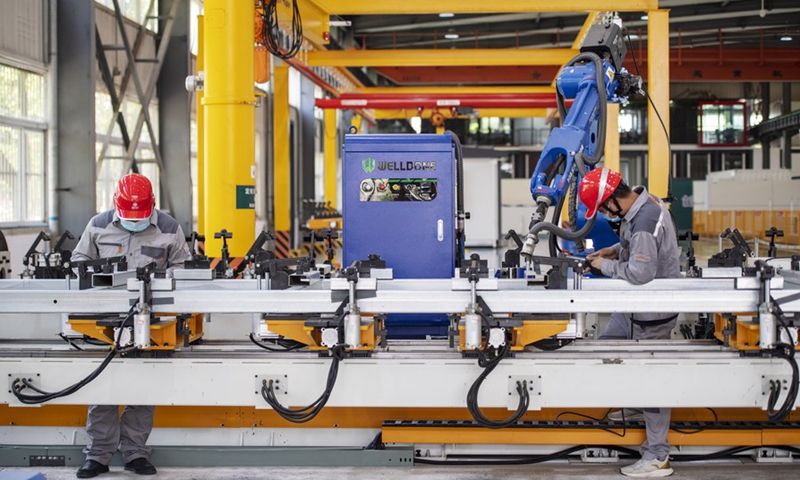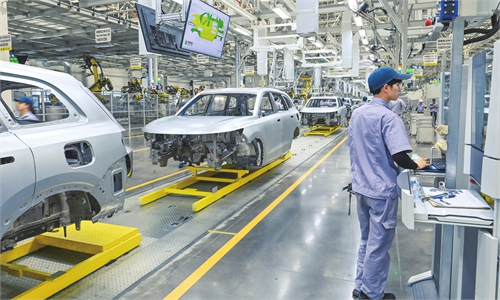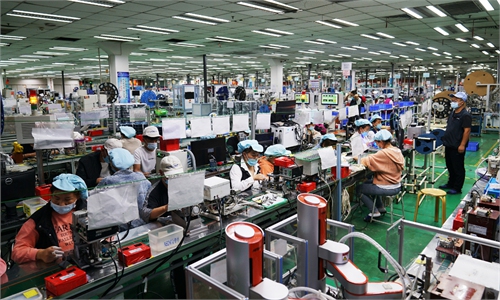China's December factory activity weighed down by COVID-19, but surveyed companies expect recovery after easing of epidemic: NBS

Staff members work at the workshop of the Anhui Electric Power Transmission & Transformation Co., Ltd. in Hefei, east China's Anhui Province, May 13, 2022. Photo: Xinhua
China's factory activity contracted in December as COVID cases prevent workers from go to work, but the majority of surveyed companies said they expect the prospect to improve after the epidemic situation is eased, the National Bureau of Statistics (NBS) said on Saturday.
According to data released by the NBS, China's official manufacturing Purchasing Managers' Index (PMI) fell to 47 from November's 48, missing expectations. In October, the reading stood at 49.2.
The epidemic has caused a sizeable impact on the supply and demand for manufacturing companies, reduced employee attendance, and disrupted logistics, according to Zhao Qinghe, a NBS senior statistician.
The 50-point mark separates expansion from contraction on a monthly basis.
In December, the percentage of companies saying they were subject to sizable impact from the epidemic rose by 15.5 percentage point from November's reading to 56.3 percent.
The new order index came in at 43.9, down 2.5 percentage points from November, while the supplier delivery time index further dropped to 40.1, reflecting the impact of disrupted logistics, workforce shortages and transportation bottlenecks, according to the NBS.
However, the PMI reading for agricultural and food processing, pharmaceuticals which are closely related to people's livelihood, remained in expansionary territory, offering hopeful signs for the broader recovery of social and economic activity, the NBS said.
Cong Yi, dean of the School of Marxism at Tianjin University of Finance and Economics, told the Global Times on Saturday that PMI data would likely significantly rebound in February at the latest, as it is generally believed that the Chinese economy will stage a rebound by the second quarter of 2023 at the latest.
The first quarter is when companies replenish their stocks and the PMI data will precede the general economic recovery, Cong said.
The Chinese economy has passed its most challenging period, and the economy is expected to show an overall improvement in 2023 despite an uncertain environment, Yin Yanlin, deputy director of the General Office of the Central Financial and Economic Affairs Commission, said at a forum held in Beijing in December.
The service aspect of PMI may also recover relatively faster than manufacturing after the optimization of epidemic control measures, Cong said.
China's services activity contraction also deepened in November. The official non-manufacturing PMI in December stood at 41.6 versus 46.7 in November, according to NBS data. About 61.3 percent of the surveyed firms said they felt sizable impact from the epidemic, up 10 percentage points from that of November.
The NBS said upcoming Spring Festival holidays represent a favorable factor, and the flight volumes of both domestic and international services were recovering significantly with PMI reading for civil aviation business activity exceeding 60. Other sectors such as telecom and broadcast, internet and information services, financial and insurances services all remained in expansionary territory.
Zhao Chenxin, vice chairman of the National Development and Reform Commission, said in an interview with Xinhua News Agency on Saturday that while the Chinese economy currently faces certain difficulties and challenges, these are issues that occur as a result of positive headway.
The Chinese economy has showed great resilience, potential and vitality, and China will remain on a positive trajectory over the long run, Zhao said, noting that with the implementation of various policies, the economy is expected to rebound in 2023.
Zhao said more efforts will be made to improve the income of residents, especially those who were hit hard by the epidemic. For investment, focus will be placed on key sectors and weak links throughout the economy.
Global Times



